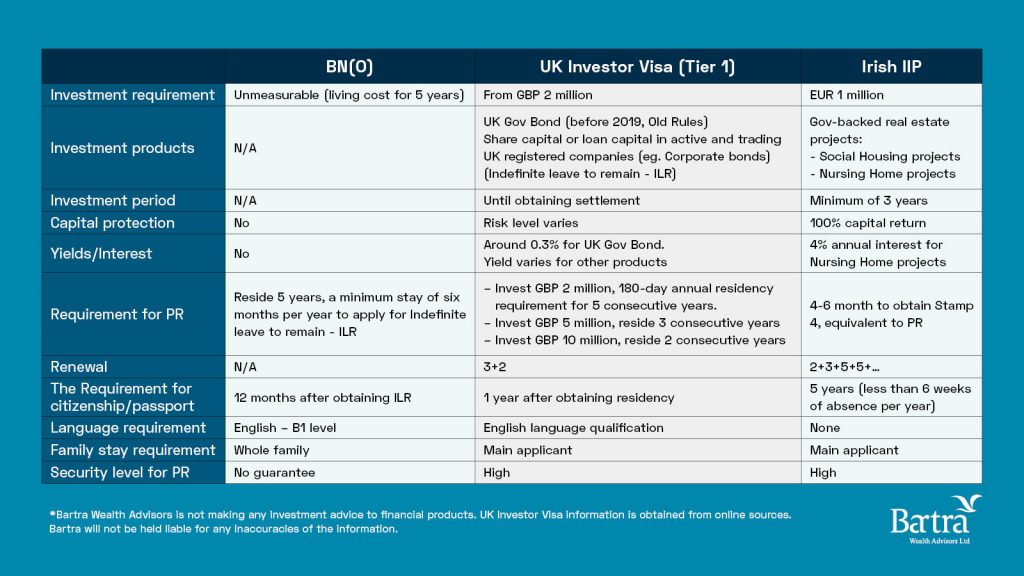“By failing to prepare, you are preparing to fail” – Benjamin Franklin
We know how important making plans ahead of time can be, which is why we are publishing this piece now instead of waiting for the Brexit transition due to take place on 31 December. Here, we hope to share some insights with would-be immigrants currently looking at whether the United Kingdom should be their future home given the uncertainty surrounding Brexit and BN(O) citizenship.
Immigration is potentially the biggest decision that an individual or family will make in their life, and it’s complex. You need to understand your options, prepare and know what to expect on relocation.
The UK is considered a traditional immigration hotspot by Hongkongers. But is it the only option? The Republic of Ireland, Europe’s rising star, has been gaining traction internationally, with its capital, Dublin, an emerging financial centre and technology hub. In terms of GDP per capita, Ireland is ranked among the wealthiest countries in the Organisation for Economic Cooperation and Development (OECD) and the EU-27. It’s certainly a worthy contender for would-be immigrants to consider.
But first, a bit of background.
Strong Historical Links
For over a century and a half, from 1842 Hong Kong was a British colony before being handed back to China in 1997. And lasting legacies of this time endure in Hong Kong, particularly with regards to education, which is largely modelled on systems in the UK, specifically England.
As early as the 1100s, Ireland was ruled by the British, with some considering Ireland to be England’s first colony. Whatever its status, Ireland inherited much from the Brits, not least elements of its education system, which has evolved over the years and is now ranked 6th best in the world and is home to seven top-level universities.
Hong Kong people are, therefore, more familiar with Ireland than they might think. Hong Kong is also home to more than 6,000 graduates from Irish universities, and the education sector in Hong Kong has long-established Irish links; tens of thousands of people in Hong Kong have studied in Catholic schools run by Irish priests. Additionally, many of the colonial Governors of Hong Kong were born in Ireland or claimed Irish heritage, as were civil servants, police and judges from throughout Hong Kong’s colonial past. Today, many Irish business people, teachers and other professionals continue to build strong ties between Hong Kong and the Emerald Isle.
Education Matters
Education is of prime importance to parents, with early childhood education instrumental in a child’s social and intellectual development. In both the UK and Ireland, once residency is obtained children of applicants are able to enjoy free education and free choice of schools.
Some Hong Kong parents prefer that their children study in private schools where the student-to-teacher ratio is often lower, allowing teachers to spend more time on average with each student. However, with a smaller population in Ireland than in Hong Kong or the UK, both public and private schools offer small classes.
When it comes to comparing the ‘style’ of education, the Irish government pays more attention to personal development than schools in Hong Kong tend to, and students have less pressure when it comes to academic studies. However, Ireland believes that education is closely related to national planning, and vigorously promotes science, technology, engineering and mathematics education, with a vision to make Ireland an international centre for technology, science and financial services. Although some parents may send their children to top universities in the UK on completion of secondary education in Ireland, many have come to realise that Ireland has just as much to offer as England’s finest further education institutions such as Cambridge or Oxford. To learn more, take a look at our article on the many strengths of the Irish education system.


Trinity College Dublin, the University of Dublin is Ireland’s leading university, ranked No. 1 in Ireland and 101st in the world
So what are the options for those considering immigration and what costs and requirements are involved?
UK BN(O), UK Investor Visa and Irish IIP
UK BN(O)
For a BN(O) visa application, there is no direct cost or investment amount required. Expenses will be based on the costs of living for the whole family for at least five years. It’s important to pay attention to the restrictions of this option, as the whole family is required to reside in the UK to maintain residency. Additionally, BN(O) residents in the UK are restricted from accessing public funds. In most circumstances, BN(O) residents will not be able to enjoy social benefits, but will still be liable to taxes and national insurance. It is also worth noting that the UK is reviewing its Capital Gains Tax, which may usher in higher taxes or cut tax exemption.
UK Investor Visa
HNWIs seeking a residency visa for the UK can consider the Tier 1 Investor visa. The investment entry level is GBP 2 million, which is comparatively lower than the investment fund required by similar programmes in, for example, Australia or New Zealand.
Successful applicants will be granted a Tier 1 Investor visa initially valid for 3 years. The Tier 1 Investor visa can be extended for an additional two years as long as the main applicant does not spend more than 180 days outside the UK per year. It can also lead to UK permanent residency if the holders are able to meet the annual residency requirement for five consecutive years and maintain the investment fund.
Irish IIP
The Irish IIP is a cost-minimised immigration approach to obtain a foreign residency. It requires a EUR 1 million investment into INIS-approved projects for a minimum 3-year investment period to receive a Residence Permit (in the form of a Stamp-4 visa) upon approval. There a number of options for investment, but the Enterprise Investment route is the most popular. Bartra offers two Enterprise Investment options, Social Housing and Nursing Homes, both of which are safe and government-backed. The Social Housing scheme has a 3-year investment period with 100% repayment and no interest offered, while the Nursing Homes scheme is a 5-year investment with a 4% annual return (paid on exit), and 100% capital protection. The income from these projects is derived from a Sovereign Government, which is often described as ‘recession-proof’, even when taking into account external factors such as Brexit or global recession.


Transferability and Recognition
The Irish IIP is a straightforward immigration approach where applicants can receive permanent residency in one step, unlike for other immigration programmes where visas are initially only granted for temporary stay. The IIP has no travel restrictions to maintain residency status – just one-day residency in Ireland per calendar year is necessary. It provides flexibility and allows people to have a residency without moving, so there is no necessity to give up current jobs or businesses. This residency is later transferred to citizenship through naturalisation, which can be started at any time.
The Irish passport is the joint sixth strongest in the world, based on the number of countries its holders can visit visa-free. Its ranking is ahead of the US, the UK, Belgium, Switzerland and Norway, and it is the only passport in the world to provide both EU citizenship and the right to reside and work in the UK.
Comparatively, the BN(O) Visa offers five-year temporary residency, while a minimum stay of six months per year in the UK is required to maintain this residency status and there is no guarantee of transferability to permanent residency or citizenship at a later stage. It is also worth mentioning that the Chinese government is considering a ban on the use of the BN(O) passport as a legal travel document.
Similarly, the Tier 1 Investor visa requires that the applicant spend no more than 180 days absent from the UK in any 12 month period for 5 consecutive years in addition to the GBP 2 million investment. With an investment of GBP 10 million, two consecutive years with the same annual residency requirement are required.
The IIP investor and his/her family will be granted a Stamp 4 Visa, which is top-class immigration status. The immigrant also benefits from the added flexibility of being able to hold this status and enjoy social welfare benefits without having to reside in Ireland. Stamp 4 Visa holders’ children can enjoy free primary and secondary education and will pay the same university school fees as locals.
The BN(O) Visa is simply a means to work and reside temporarily in the UK. These immigrants have no access to social welfare benefits and its holders are often described as second-class citizens, which is an important element to bear in mind as quality of life should be a key consideration when weighing up options.
A Client Case Study
Bartra Wealth Advisors has received more than 1,600 enquiries related to immigration to Ireland in the past three months. Since August 2019, we have helped more than 50 families from Hong Kong successfully apply for Irish residency.


Jeffrey Ling, Regional Manager at Bartra Wealth Advisors in Hong Kong, shared one client story. Peter and May (both pseudonyms) are married with three children attending elementary school in Hong Kong. High-income, senior professionals, the couple had purchased properties in Hong Kong for investment purposes. They were keen to send their children (or go with their children) overseas to study, with a preference for an English-speaking country. However, their biggest concern regarding immigration was that they may not be able to find a job with a similar level of income after relocation, especially considering the current challenging times. The flexibility of the IIP was attractive, as it allows them to keep their jobs in Hong Kong while also obtaining residency overseas. In addition, due to its minimal residency requirement, they are considered non-Irish tax residents residing for fewer than 183 days a year, so there is no fear of double taxation. With its stable economic environment, strong legal system, world-class education, and accessibility to both the UK and EU, the couple felt that Ireland and the IIP fit their needs perfectly. The Advisory Agreement was signed with Bartra predominantly because the Enterprise Investment option we provide offers 100% capital protection with transparent and clear investment procedures. To find out more about the IIP and the projects we offer, start by reading our article The 4 Things You Must Know About the Ireland Immigrant Investor Programme.
In a recent webinar with South China Morning Post, we compared investment and immigration opportunities in the UK and in Ireland. Guest speakers included Liam Baily, Global Head of Research at Knight Frank; James Hartshorn, CEO and Co-Founder at Bartra; and Cheryl Arcibal, business and property journalist at South China Morning Post.
We hope this article provides you with the information you need to weigh up the available options and consider what works best for you and your families in terms of cost, requirements and quality of life.
Look out for upcoming articles where we’ll be comparing the economy and property markets in the UK and Ireland. If you have any questions or would like to find out more about the IIP, feel free to contact us directly.